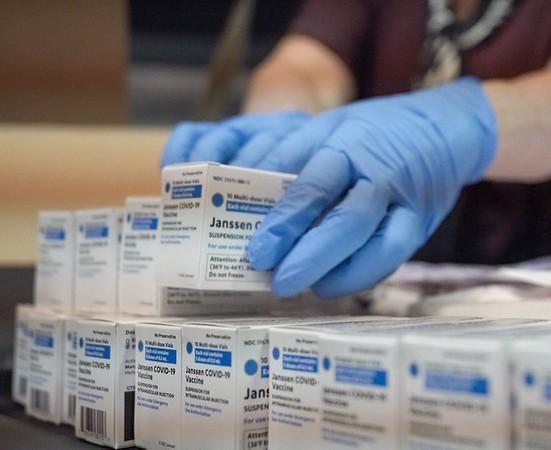The Food and Drug Administration (FDA) vaccine advisory group today unanimously approved a booster dose of Johnson & Johnson (J&J) vaccine for all Americans 18 years old and older who received a single dose.
Also today, the experts discussed mix-and-match dosing, raising several questions and airing multiple issues, but they took no vote on the issue.
Booster would target all J&J recipients
Today's vote by the FDA's Vaccines and Related Biological Products Advisory Committee (VRBPAC)—affirming that data support the safety and effectiveness of the J&J booster dose—was unanimous and followed the group's unanimous nod for Moderna boosters yesterday for high-risk groups.
The group's decision is nonbinding, and FDA officials will make the final decision, paving the way for Center for Disease Control and Prevention vaccine advisors to hold their recommendation discussions, slated for next week. In February the FDA granted the J&J vaccine emergency use authorization (EUA) as a single-dose product.
Unlike the booster recommendation for the two mRNA vaccines (Moderna and Pfizer-BioNTech), which targets those at highest risk, today's booster recommendation includes anyone who got the J&J vaccine. The booster should be given at least 2 months after the primary, or initial dose. About 14 million doses of the vaccine have been given in the United States.
Earlier this month, the company applied to the FDA to amend its EUA, based on data it provided showing that a booster increases effectiveness to 94%. At one dose, the vaccine is 71% protective, according to the CDC, which is high, but not as high as for the mRNA vaccines.
Before today's meeting, the FDA's scientists released a briefing document indicating that a benefit for J&J boosters looked promising, but they said the data were limited.
During today's discussions, VRBPAC members said the vaccine should be considered a two-dose product, which got pushback from the company. Many experts consider the one-dose primary series as one of the vaccine's strengths, which makes it easier to deliver, especially in hard-to-reach populations.
Mix-and-match deliberations
After the vote, VRBPAC members discussed data from recent findings on mixed doses from a National Institutes of Health (NIH) preprint study, which found a benefit for all booster combinations, but that Johnson & Johnson recipients had a stronger immune response after getting an mRNA booster.
Michael Kurilla, MD, PhD, who directs the Division of Clinical Innovation at the NIH, wondered if it would be worth parsing out each vaccine combination and that the focus should be full approval for each of the vaccines.
Experts also worried that moving forward with mix-and-match actions would confuse the public and pose messaging challenges.
Archana Chatterjee, MD, PhD, dean of Chicago Medical School at Rosalind Franklin University, said the topic is well worth exploring, especially for certain groups such as those who had allergic reactions to their initial COVID-19 shot. She added that mix-and-match issue raises a host of questions, such as what would happen with children's immune responses and how long the immune boost would last.





















